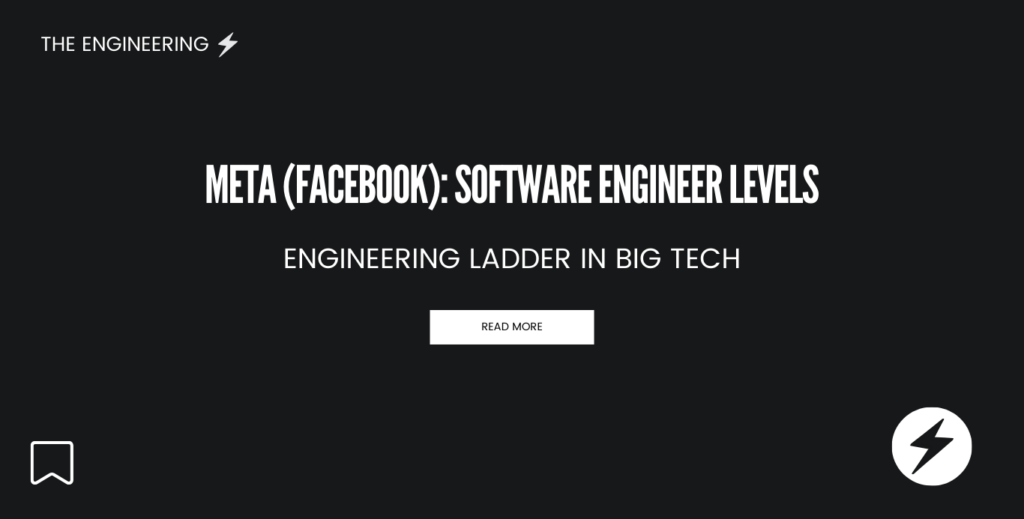
Meta Levels for Software Engineers
Meta (formerly Facebook) has a well-defined structure and levels for software engineers, starting from E2 (IC2) for interns/students. This article will focus on levels E3 (IC3) to E10 (IC10), covering fully qualified engineers and individual contributors. These levels define career progression, responsibilities, and compensation, ensuring clarity and growth opportunities for engineers at Meta.
We’ll provide an overview of what to expect at each individual contributor level. Leading tech companies, particularly FAANG (Facebook/Meta, Amazon, Apple, Netflix, and Google), use structured levelling systems to standardize compensation, ensuring fairness and consistency based on job roles, qualifications, and responsibilities.
At Meta, entry-level software engineers start at the E3 level and can advance to higher levels like M2 (Software Engineering Manager) or E8 (Principle Software Engineer), depending on their skills and experience. In contrast, Google designates its entry-level software engineers as L3.
This article explores Meta’s software engineer levels, looking at career progression, compensation, and professional growth opportunities within the company.
Meta Individual Contributor (IC) Levels
- E3 – Software Engineer ||
- E4 – Software Engineer |||
- E5 – Senior Software Engineer
- E6 – Staff Software Engineer
- E7 – Senior Staff Software Engineer
- E8 – Principle Engineer
- E9 – Distinguished Engineer
- E10 – Engineering Fellow
E3 – Software Engineer ||
E3 Software Engineers join the company from university or have a couple of years of commercial experience (intern or apprentice). They are expected to have autonomy sufficient to complete individual tasks without much guidance, deliver production-quality code, use tools, implement good tests, and write documentation.
Though not critical, people and soft skills are still important. With the expected level of coaching, they should be able to receive constructive feedback, work on it, and improve proactively.
At Meta, Software Engineers at Level E3 are expected to be well-rounded engineers who can deliver good-quality code and features and exhibit a strong growth mindset. Engineers at that level are expected to grow to E4 within 24 months.
E4 – Software Engineer |||
E4 Software Engineer: As a Software Engineer Level |||, your responsibilities include working on projects to deliver complete features. You will be responsible for the project’s technical specifications and work collaboratively with other teams to ensure successful delivery. While working primarily independently, you should assist your colleagues by conducting code reviews or providing constructive feedback on technical decisions.
E5 – Senior Software Engineer
E5 Senior Software Engineer: You own a problem space/project end-to-end and should create scope for yourself and others in the team. You are driving technical alignment and collaboration across functions and teams. As a Senior Software Engineer, you help other engineers grow through mentoring and coaching. You set and maintain the quality bar for the team. You can drive and deliver through others.
E6 – Staff Software Engineer
E6 Staff Software Engineer: You play a critical role in setting the direction and goals of the team. As a Staff Software Engineer, you are responsible for driving roadmapping, scoping work, and managing technical problems outside the team while influencing the organization. You are the one that deals with the most complex issues. If needed, you can cover for missing PM or EM in the team and advocate for high quality and engineering excellence.
E7 – Senior Staff Software Engineer
E7 Senior Staff Software Engineer: Different tracks and Archetypes focusing on breadth or depth regarding technical complexity, working on large programs spanning multiple teams and orgs, and setting the organizational direction of a significant problem. These engineers are involved in building high-performing engineering teams and organizations.
E8 – Principal Engineer
E8 Principal Engineer: Industry expert/leader. You have an impact beyond Meta into an industry or specific technology area, and you are very passionate about an area and champion it. As Principal Engineer, you drive technical, process and cultural changes to help the company move fast. You are pursuing many complex incremental changes instead of just building new/shiny pieces of technology. You are a great coach, and people follow you.
E9 – Distinguished Engineer
E9 Distinguished Engineer: In the US, these engineers earn over $2.5M annually. Among thousands of engineers at Meta, fewer than 50 (less than 1%) achieve this level. E9 engineers are known for their exceptional ability to uplift their teams, creating significant projects and clear tasks that help teammates rapidly advance. This leadership and talent development foster loyalty and capability, enabling E9 engineers to achieve substantial impact. They exemplify the importance of scaling one’s influence through others to become effective tech leads.
E10 – Engineering Fellow
Meta has very few engineers at this level. They are all internally grown and never hired externally. This level is similar to Google’s Fellow level. One example is Mike Schroepfer, Meta’s ex-CTO and currently a Senior Fellow. He organizes the famous (internal) SchrepTech, keeping all staff members connected with the amazing technology teams building across the company.
Meta Engineering Levels Expectations
The vital difference between an IC3 and an IC10 is not the volume of work they directly produce but the scope of problems they solve, the quality of those solutions, and how they deliver results. The higher the levels, the bigger the “blast radius” you have, i.e., you impact more people, teams, product metrics, and revenue across the company with your direct and indirect influence and contributions.
Big Tech: Engineering Culture
Engineering Levels Abbreviation at Meta
You might have come across different abbreviations for levels. Let’s take IC6, L6, E6, M1 as an example. Many people wonder if they are different and what exactly is the difference between them.
Let’s look first at the letters portion and understand what they mean.
- L – stands for “Level.” It is pretty self-explanatory, and Google and Microsoft mainly use it. This straightforward abbreviation can be used across many roles like PM, TPM, Designers, etc.
- E – stands for “Engineering” at the Engineering Level, but that is more restrictive and, may I say, discriminates against specific roles, i.e. not all employees are Engineers; some are Content and Product Designers, Product Managers, Technical Program Managers, Policy, Legal, Project Managers, etc. This one is used conversely around roles in Meta, but it is not an official one.
- IC – stands for “Individual Contributor“. This acronym has a more generic use and is a standard-level description. It also incorporates the actual role of the employee, i.e. everyone can be an Individual Contributor, regardless of the type of work, which is more inclusive. Also, this shows that the person does not have people management expectations.
- M – since we have introduced a new letter, let’s cover it too. This letter stands for Manager and can be used for different roles and technical domains. “M” is used in Meta for all people managers, such as PM, Engineering, and Data Engineering Managers. This level can also correspond to an “L” type level, for example, M1 = L6 and M2 = L7.
Difference Between L/E/IC Notations
Suppose you wonder if there is a difference between L6 – E6 – IC6. The answer is no. There is no difference in terms of roles and levels. They all represent the exact expectations. That said, different companies, such as Google, Meta, Apple, Microsoft, Netflix, etc., use those abbreviations, so comparisons can vary across these companies. They are looking at the expectations at Google for an L6 engineer. That person might be L7 in a startup or another company, depending on their skills and their exposure to various technical and business problems.
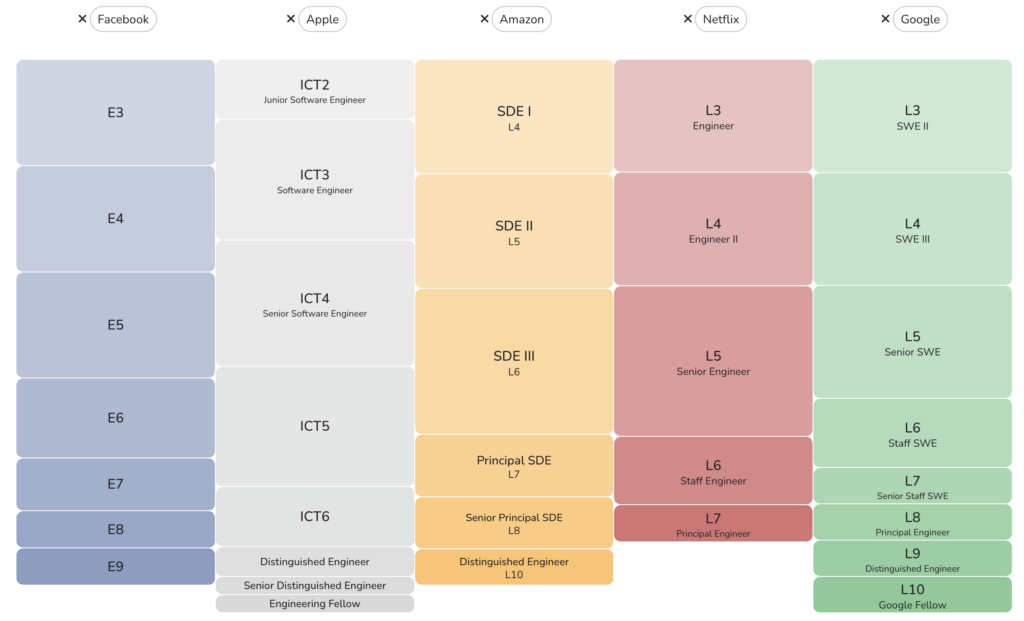
Meta Compensation Structure (inc. Examples)
Like many large tech companies, Meta designs its compensation structure for each engineering level to attract and retain top talent by offering a competitive mix of salary, stock options, bonuses, and benefits. This structure typically consists of several key components:
1. Base Salary
The employee’s role, level, experience, and market rates for similar positions determine the base salary, the fixed annual compensation paid to an employee, excluding bonuses, equity, or other benefits.
2. Stock Options/Restricted Stock Units (RSUs)
Meta, a publicly traded company, offers stock options or Restricted Stock Units (RSUs) as part of the compensation package. These equity components align the interests of the employees with the company’s success. RSUs are company shares given to employees as part of their compensation, but they come with a vesting schedule, typically over four years. This means the employee gains control of the stock over time, encouraging them to stay with the company longer.
3. Bonuses
Bonuses are performance-based cash payments. They are tied to individual, team, and company performance. These are typically awarded annually and can significantly increase employee compensation based on their and Meta’s success.
4. Benefits
Beyond the monetary compensation, Meta offers a comprehensive benefits package, including health insurance, retirement savings plans, parental leave, wellness programs, and more. These benefits contribute to the overall compensation but are not typically quantified in the total compensation figure. These benefits are the same and available for all Engineering Levels at Meta.
Example of Compensation Structure
Let’s consider a hypothetical example for an E3 Software Engineer Level’s Salary at Meta:
- Base Salary: $120,000 annually. This is the fixed cash component paid out in monthly salaries.
- Stock Options/RSUs: $40,000 annually, vested over four years. This means the employee is granted $160,000 worth of RSUs, which start vesting after one year of employment at a rate of $40,000 per year.
- Bonus: $15,000 annually, depending on personal and company performance.
- Total Estimated Compensation: $175,000 annually, not including benefits.
Meta Stock Options Vesting Schedule
Meta offers Stock Options called Restricted Stock Units (RSU); these are treated as cash compensation. For the RSU component, if the vesting schedule is over four years with a one-year cliff, the employee must stay with the company for at least one year to receive the first 25% ($40,000) of their RSUs. After the cliff, the remaining RSUs typically vest monthly or quarterly over the next three years.
This compensation structure is designed to be competitive, reward employees for contributing to the company’s success, and incentivize long-term employment. However, the exact figures can vary based on many factors, including negotiation, the company’s stock price, and more.
Meta Software Engineer Average Salary Overview
The salaries for engineers for each level at Meta, like at most tech companies, comprise a base salary, stock options, and bonuses. While specific figures can vary widely based on the individual’s negotiation skills, tenure at the company, and the company’s current compensation strategy, here’s a broad overview:
- E3 (Software Engineer): The total compensation typically starts in the lower six-figure range but varies based on location and other factors.
- E4 to E5: These IC levels significantly jump, with total compensation moving into the mid to high six-figure range.
- E6 and above: Compensation at these levels can vary widely, often reaching into the seven figures for E8 and above, especially when factoring in stock options and bonuses, which can make up a large portion of the total pay.
Remember, these figures are indicative and fluctuate based on market conditions, individual performance, and negotiation. Meta is known for offering competitive packages to attract and retain top talent. It’s also essential to consider factors such as work-life balance, career development opportunities, and company culture when evaluating a job offer.
So here is the list of salaries for each Meta Engineering Level broken down into 3 main components: Base Salary, RSUs, Bonus and finally, Total Compensation (TC) (Source levels.fyi):
| Level | Base Salary | Stock Options (/yr) | Bonus (avg) | Total Compensation (Estimated) |
|---|---|---|---|---|
| E3 | $130,000 | $45,000 | $20,000 | $195,000 |
| E4 | $170,000 | $105,000 | $25,000 | $300,000 |
| E5 | $215,000 | $225,000 | $30,000 | $470,000 |
| E6 | $250,000 | $400,000 | $50,000 | $700,000 |
| E7 | $300,000 | $1,005,000 | $65,000 | $1,370,000 |
| E8 | $350,000 | $1,250,000 | $100,000 | $1,700,000 |
| E9 | $380,000 | $2,450,000 | $150,000 | $2,980,000 |
Meta Core Company Values
At each Meta engineering level, the person will have to focus and exhibit impact across most or all Meta “Core Values”. These values are fully embedded in the performance evaluation and company processes.
- Move Fast
- Focus on Long-Term Impact
- Build Awesome Things
- Live in the Future
- Be Direct and Respect Your Colleagues
- Meta, Metamates, Me
Frequently Asked Questions
At Meta (a.k.a. Facebook), the E5, or IC5, is officially called the core level for engineers. The reason to call it the core level is that everyone must eventually reach it. There are strict expectations for IC3 and IC4 engineers to be promoted to the next level.
Yes, it can be challenging due to the breadth of topics and specific projects required. Joining a recognized interview preparation program can help. People must present strong skills across Technical rounds (Coding, System Design, Product Architecture) and Behavioral rounds.
The hourly pay for software engineers at Meta varies based on level and experience. On average, an entry-level engineer (E3) can expect to earn approximately $74-$95 per hour, while more senior levels (E6 and above) can earn significantly higher rates, $100-$195 per hour, reflecting their increased responsibilities and expertise. At Meta, based on Glassdoor, a software engineer’s average hourly base compensation is $85, and the average hourly bonus is $44.
Yes, it is possible. Self-learning, coding boot camps, and personal projects can help. A strong CV showcasing skills and expertise is crucial. In cases where the candidate doesn’t have a university degree, they should present at least 3+ years of strong commercial experience.
Here are some steps and tips to follow:
▪️Learn popular programming language. Focus on languages like Python, JavaScript, and Java.
Obtain software certifications
▪️Pursue certifications relevant to your desired field.
▪️Gain experience Through part-time or freelance IT Jobs
▪️Practical experience is highly valuable.
▪️Attend a Boot Camp. Intensive training programs can provide crucial skills.
▪️Enroll in Career Preparation and Interview Courses to prepare for the job application process.
Take industry-specific courses
At Meta, a Tech Lead is typically at the E6 (Staff Software Engineer) or E7 (Senior Staff Software Engineer) level. These roles involve setting team direction, managing technical challenges, and influencing organizational goals. The specific level may vary based on the size and scope of the team or project they lead.
An E9 Engineer, or Distinguished Engineer, at Meta, earns over $3,251,000 annually. These engineers are rare, making up significantly less than 1% of Meta’s engineering team. Known for their exceptional technical, writing and leadership skills, E9 Engineers lead significant technical and cultural initiatives within the company. Their work is highly visible, and even though most employees do not work directly with them, they influence the strategy, technology, and product of many teams on the ground.
Join Me
Follow me on Twitter and Linkedin for more Career, Leadership and Growth advice.
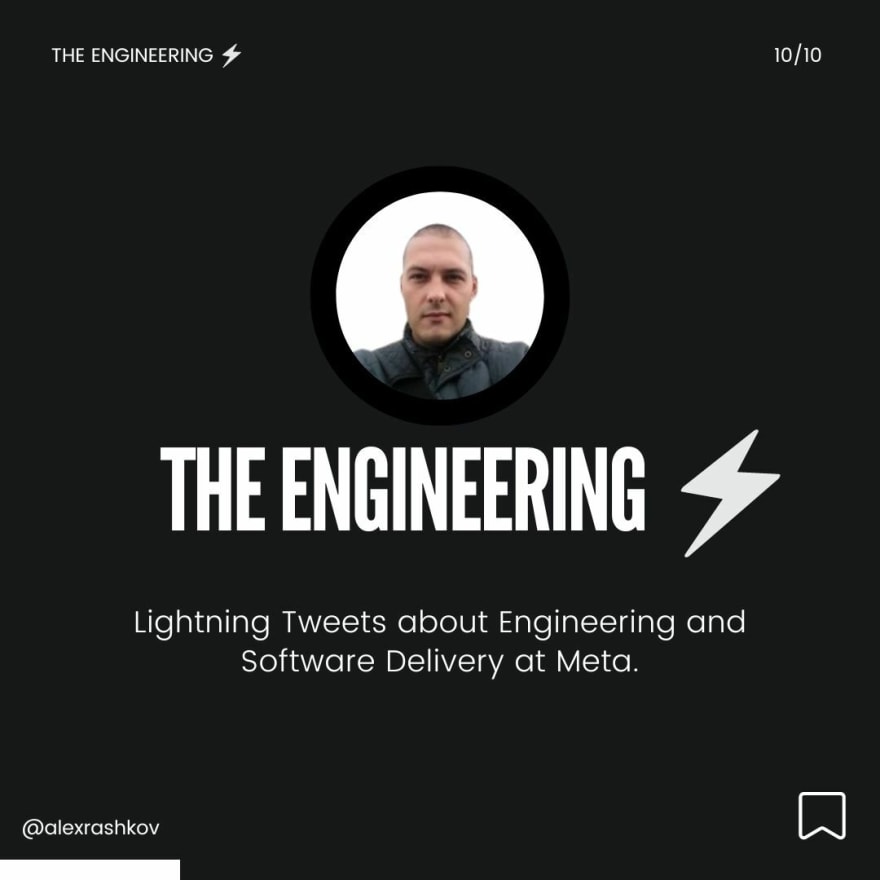

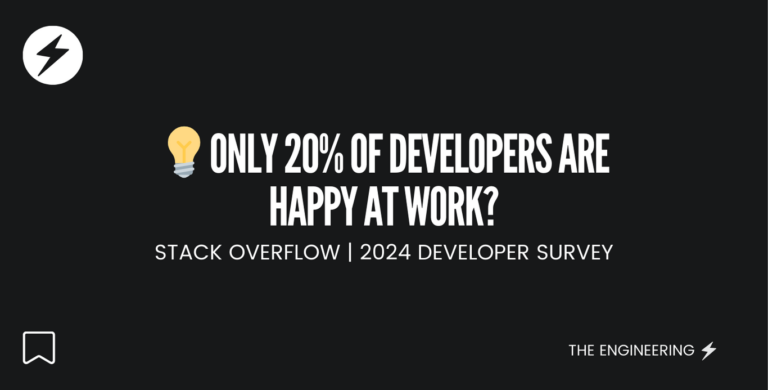
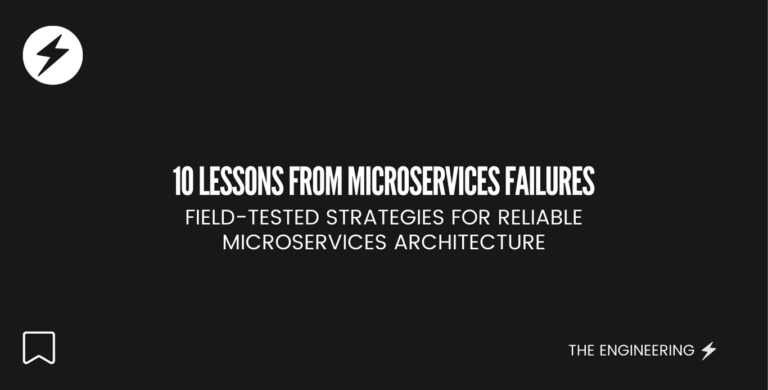


[…] nurtures an environment where teams can unleash their full potential and reach unprecedented levels of […]
[…] engineering team, you may also be feeling a bit of pressure, especially if you’re managing experienced engineers. After all, they have more experience than you, and they may be wondering why you’re now […]
[…] event will be live streamed on Facebook, which makes sense given this is Meta’s big annual VR/AR conference. However, you can also […]
[…] you are planning to apply for a job as an Engineering role you will need to pass Systems Design Interview. Each interview covers High-level and Low-level […]
[…] Engineering Levels: Google, Meta and other […]
[…] highre up you go in terms of seniority, the more important are behavioral interviews for geting the right approved for the respective […]
[…] 🗣 Month 8: Develop Leadership Skills […]